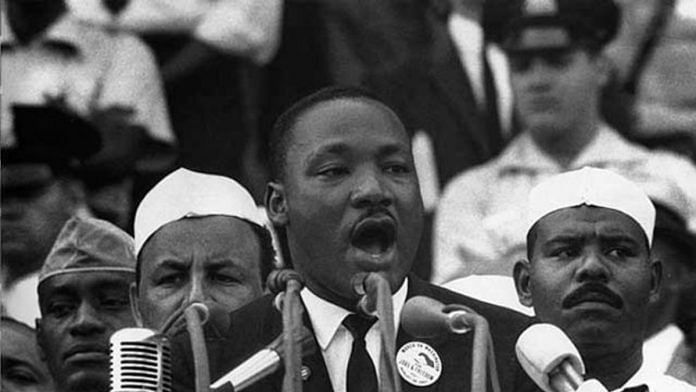Martin Luther King Jr. was one of America’s greatest leaders. Although he was not a President, his birthday is a national day in the US. It is to be noted that Presidents are the only other Americans who are remembered in this way.
So, what made Martin Luther King Jr. so prominent in the history of America?
In the first half of the 1900s in the American South, African-Americans were suffering terribly under white men’s laws. Although, in 1865 President Abraham Lincoln ended slavery, life did not change much for the African-Americans in the Southern States of America. Jim Crow laws were passed in the South in order to segregate black people from whites. The black people could not go to the white people’s restaurants, hotels, churches, or schools. Very soon the US government passed a law that accepted segregation in all states.
In 1954, the US government, after facing strong opposition from the NAACP, finally passed a law that made segregation in schools illegal. Nonetheless, segregation in all other matters, including in buses continued. It is at this time, Martin Luther King Jr. emerged as an important leader in the fight against racial segregation in America. King Jr. who was highly influenced by Mahatma Gandhi’s non-violence approach, took part in the famous boycott of the Montgomery city buses. After 382 days of the boycott, the US government passed a new law that made segregation on buses in all states illegal. King Jr. did not stop there, he continued to take part in protests and boycotts that were meant to end segregation in all forms. He participated in the famous sit-in organised by students at lunch counters to eliminate segregation in the latter.
Martin Luther King Jr’s vision clearly reflected his core belief that individuals should be judged on the basis of their character rather than the colour of their skin. His most popular and impactful speech- The “I Have a Dream” speech, resonated not only within the United States but also across the globe.
Relevance of the teachings of Martin Luther King Jr. in Indian context:
In India the deep-rooted issues related to colourism and the preference for lighter skin tones have been continuing for decades. Undoubtedly Indians’ obsession for white and fairer skin is the product of years of interaction with the colonial rulers. In India’s context white race was the ruler and the dark natives were the ruled. This led to the internalization of superiority of the “white” skin and inferiority and powerlessness of the “dark skin”.
Although dark-skin is perceived to be disadvantageous for both men and women, in reality women are likely to face more discrimination than men when it comes to skin colour. From matrimonial sites to the film industry, beauty standards and preference for lighter skin have created havoc in the lives of women. I call these beauty standards as subtle instruments of the patriarchs to continue their domination over women in the society.
Whereas the women from the high and privileged class have found an escape through the skin lighting technologies, the women belonging to lower and less privileged classes continue to face the brunt of the society’s beauty standards. The recent trend among Bollywood actors to embrace lightening technologies echoes the broader societal preference for lighter skin, perpetuating traditional and exclusive beauty standards. This inclination may culminate into the under representation of diverse skin tones in the industry and reinforce harmful stereotypes.
These stereotypes become intensely detrimental when they affect the mental well-being of adolescents who frequently idealize models and actors. They have the tendency to instigate an inferiority complex among individuals with dark skin tones, thereby undermining their self-confidence.
Unfortunately, skin colour has become one of the important determinants of people’s acceptability in society. Although skin colour prejudices seem to go beyond the limits of caste and class, the reality is paradoxical. A darked skinned person from high caste and class background is more likely to be accepted in the society compared to a white skinned lower caste and class person. Thus, we can clearly see the intersectionality of caste and class playing a determining role in a society stricken by white skin prejudice. Therefore, breaking free from the shackles of white skin prejudice requires a holistic and multifaceted approach that will address the interconnected nature of various societal prejudices.
In this context, we can rely upon the major teachings of Martin Luther King Jr. His emphasis on the inherent value of every individual, irrespective of race or colour, can offer us a framework to challenge Indians’ obsession with fair skin. By following his footsteps Indians can hopefully dismantle the deeply ingrained obsession with white skin, fostering a society that values diversity and inclusivity.
Reference:
1) Nagar,I.(2018).The Unfair Selection:A Study on Skin-Color Bias in Arranged Marriages.Sage https://journals.sagepub.com/doi/full/10.1177/2158244018773149
2)Mishra.N.(2015).India and Colorism:The Finer Nuances.Washingto U.Global Stud. L.Rev.
https://openscholarship.wustl.edu/law_globalstudies/vol14/iss4/14
These pieces are being published as they have been received – they have not been edited/fact-checked by ThePrint.

